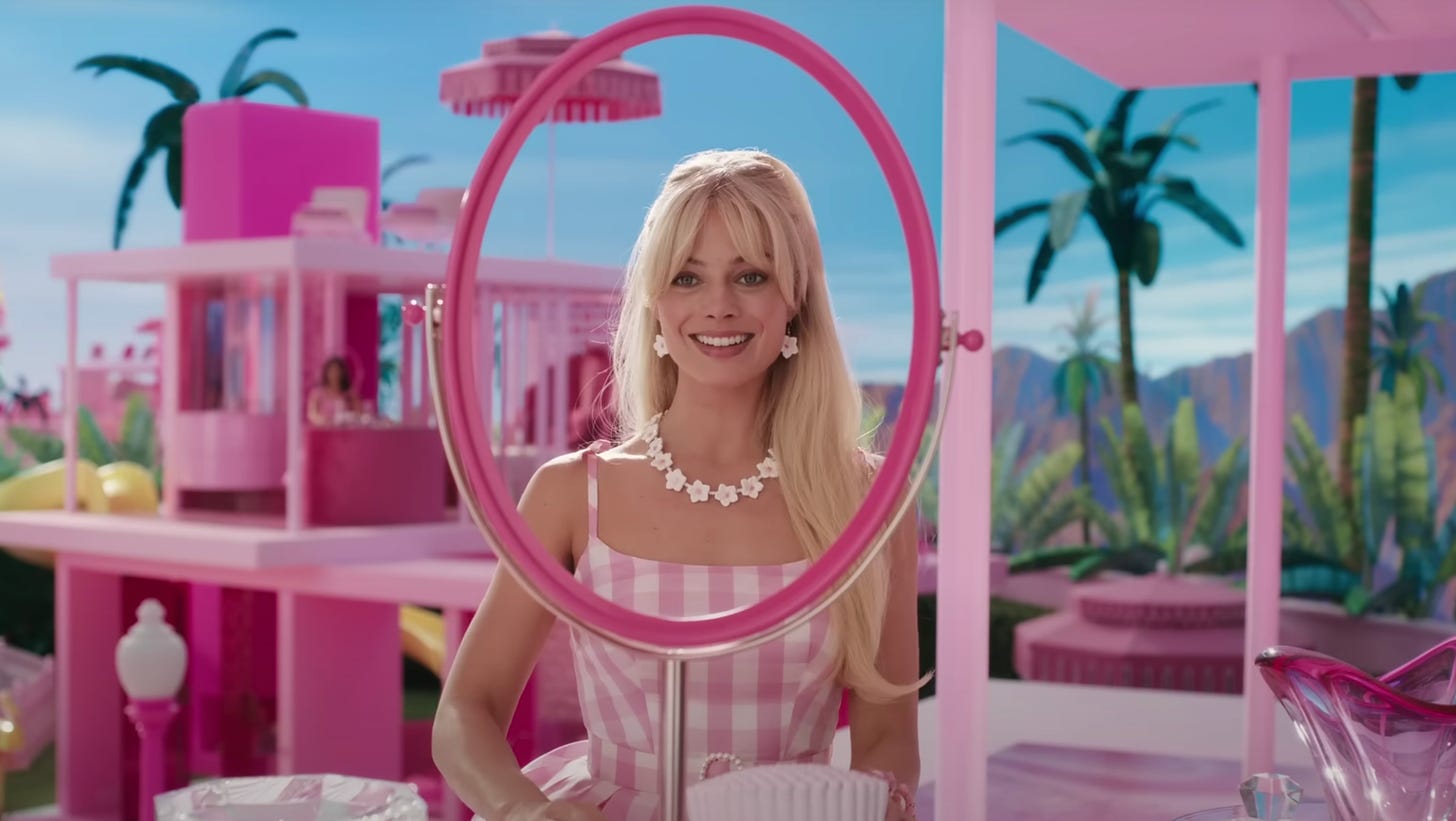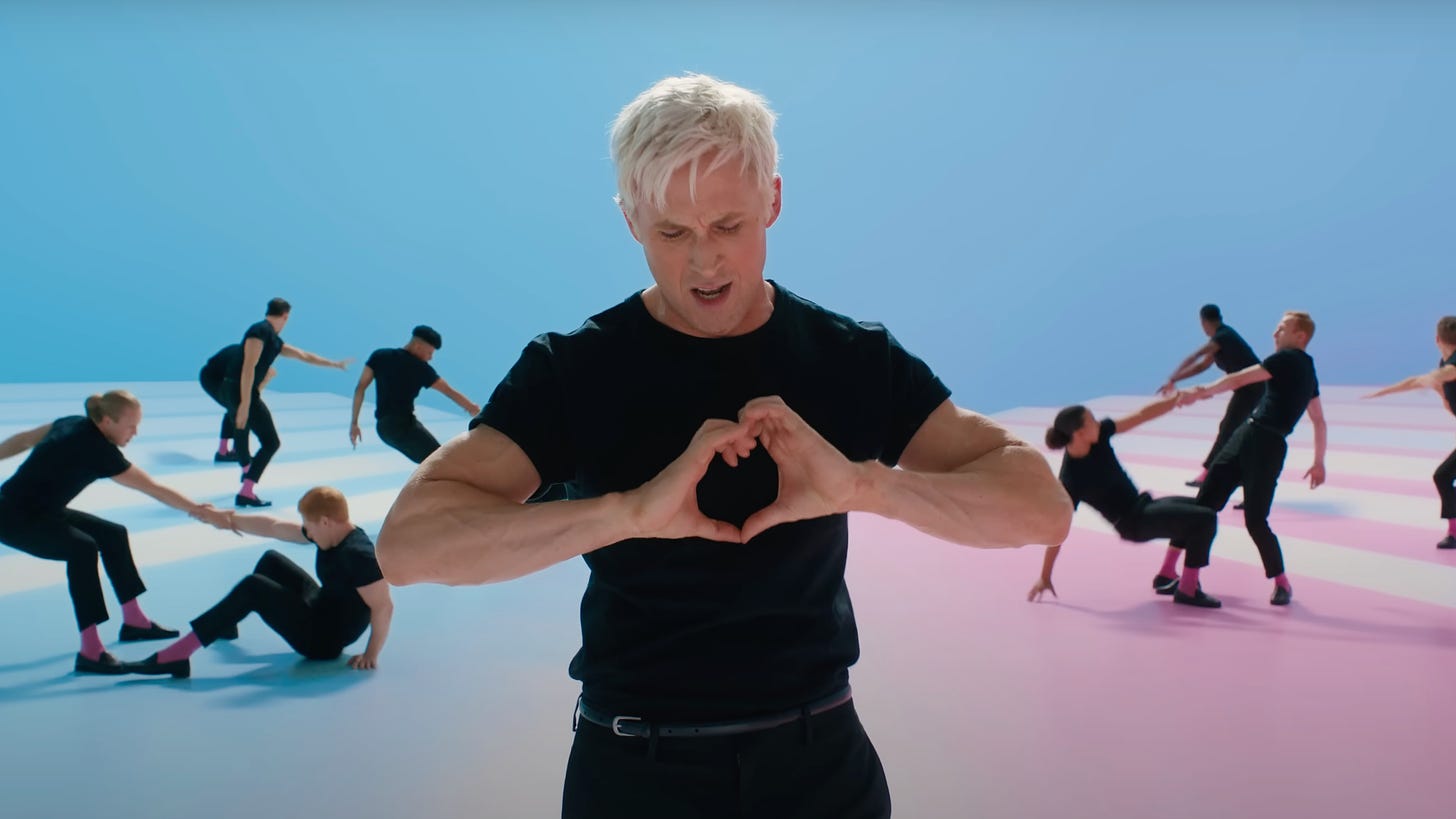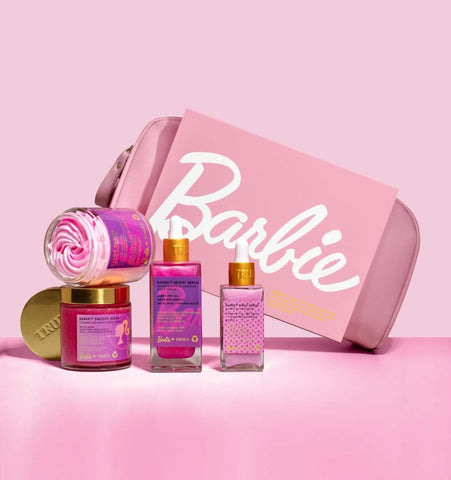I fear I’m not delivering on my promise to you, dear reader. Well, not entirely. In an article I wrote in April about Barbie (2023)’s imminent release, I had soft-promised a follow-up on my thoughts on the film after its July premiere; however, after watching it for the first time, I don’t feel compelled to think about the movie as much as I expected, let alone write about it. You know that feeling when you exit a movie theatre and feel as though your whole life has changed? You linger in the afterglow of the film for days (even weeks!) after viewing it, wondering what the fictional characters would be up to if the story were to continue. I’ve felt this feeling after viewing copious movies: Titanic (1997), Twilight (2008), and most of all, Greta Gerwig’s Little Women (2019). After I finished my first Barbie (2023) viewing I felt…well…not as much as I thought I would. So I offer you this.
The movie was very pretty and made me laugh quite a bit, but the reason for its forgettable nature largely relates to what I, for some reason, thought would be its most poignant feature: feminism. I suppose I expected a more layered, nuanced exploration of the transition from girlhood to womanhood, in all its beauty and devastation, as that’s what Gerwig has become known for in her work. In my opinion, though the film had its glimmers, nothing came close to the amount of feeling encaptured in Jo’s “I want to be loved” monologue in Little Women (2019). And in my opinion, much of the messaging harkened to the slightly cheesy, Rachel Platten “Fight Song,” #girlboss feminism of the 2010s, not adding anything new to the conversation, per say, but certainly delivering it in a visually appealing way.
I’ve found similarly mixed reactions across the internet, but much praise. Some are seemingly dubbing Barbie (2023) The Next Great Feminist Manifesto and others are jumping for joy over big movies and the theatre experience finally being back. These points, and variations of them, have been turning over in my mind more often than the Barbie (2023) plot itself - specifically regarding which types of movies we absolve from criticism. For example, in the 1990s, a Julia Roberts rom-com could gross upwards of $300 million at the box office off its star power, palatable characters, and paint-by-numbers plot alone. Those movies, and many similar ones, are held in high regard by many of the same cinephiles who will call certain Best Picture runners too try-hard. I, myself, am quick to give the at-times downright offensive rom-coms of the 80s and 90s a nostalgia-fueled five-star Letterboxd rating but am just as quick to torch the liberal feminism in Barbie (2023).
Why are we so selective about the art we deem necessitating critique? Are we hypocritical consumers? Whenever someone asks how my brain can appreciate both feminist theory and the Twilight saga, I usually just laugh it off, exclaiming “I contain multitudes!” and moving on to the next subject. It’s no secret that humans are replete with contradictions, but there are certain media that appear to dwell in a public discourse-free, no-fly zone, in which we can view and enjoy with a different part of our brains, one disinterested in precise messaging and most interested in chewable tropes and boxes. “Anti-capitalist” consumers running free in Disneyland. Or Barbieland.
I was first introduced to “art for art’s sake” criticism in a college course on the history and theory of photography. Asserted in the nineteenth century as an alternative to the Marxist aim of politicizing art, “art for art’s sake” or l'art pour l'art proclaimed that art was valuable as art itself. Art could be neutral or subversive, it needn’t strive toward a moral outcome but could be justified on the grounds of the artistic pursuits themselves. Art could be evaluated based on its ability to evoke feeling in a viewer, not just deliver a message concerned with ethics, and on its use of formal qualities like line, color, shape, and so on. The philosophy became associated with artists and thinkers like Charles Baudelaire and countered by theorists like Friedrich Nietzsche, who often claimed that the arts always express human values and one’s core beliefs. In Twilight of the Idols (1889), he writes:
“When the purpose of moral preaching and of improving man has been excluded from art, it still does not follow by any means that art is altogether purposeless, aimless, senseless — in short, l'art pour l'art, a worm chewing its own tail.”
I became quite fascinated with the concept of art existing solely for the sake of it. Before taking this course, I had only found myself drawn to paintings, music, and photographs that had “something to say” - typically some kind of hard-pilled message about our society’s impending collapse. I cynically considered all other work frivolous or designed for those disinterested in stretching their minds, particularly art that was pleasant to view. Learning about l'art pour l'art took the egotism out of appreciating art and replaced it with a mindful consumption experience. I could look at a painting and let the feeling wash over me like a warm midsummer rain. I could identify what exactly was compelling me to experience that emotion. Is it the color? The shape? Or perhaps how all parts work in concert together, joining at this apropos moment to evoke this feeling.
I often find a modern version of “art for art’s sake” being extrapolated when internet users are defending a beloved work that’s either widely considered technically poor or that contains less seemly messaging. This defense is typically made on the grounds of people being allowed to “enjoy” movies, TV, and music, specifically women. Girls should be allowed to have fun! Twitter users shout in the face of criticism on films like Jennifer Lawrence’s No Hard Feelings (2023), Barbie (2023), and the like. Isn’t it great that we finally have fun movies back?
Who am I to shut down fun? It’s true, in a world where it’s pretty easy to get stuck in gloom and doom, reaching for media that instills a bout of ecstasy is never not enticing. Bright colors, sparkles, easy laughs, and formulaic plotlines are like candy and bitterness cannot be balanced without sweetness.
Nonetheless, I find it challenging to view heavily commercialized art in the same mindful fashion that art for art’s sake criticism upholds. Such art isn’t existing on the merit of art alone and it’s not as stripped of messaging as one may think. It’s just that it’s delivering an alternative message, not one as concerned with morals as it is with sales, or aligning one’s brand in a way that makes viewers comfortable transacting.
In this article for The New Yorker, Mattel CEO Ynon Kreiz tells writer Alex Barasch that more movies showcasing Mattel IP are to come. After the bankruptcy of Toys R Us and so much of children’s play being digitized, toy sales simply haven’t been what they used to be. Following Marvel’s lead, Kreiz acknowledges that there is more material and cultural cache to be reaped by leveraging intellectual property, telling Barasch:
“My thesis was that we needed to transition from being a toy-manufacturing company, making items, to an I.P. company, managing franchises.”
In the end, Barbie (2023)’s story - while maybe written with well-intentions by the talented Greta Gerwig and while containing some touching moments about the fallibility inherent in being a real woman - was a Mattel commodity produced and sold to viewers like the plastic dolls themselves. Aligning Barbie as a “feminist” - or rather as a character being awakened to the realities of patriarchy - does viewers just as much good as it does for Mattel’s branding. Perhaps if the film existed in isolation from the brand, I would have been able to feel its messaging a lot stronger. Perhaps. But the behemoth marketing campaign associated with this film - in which every consumer product imaginable, including anti-cellulite body butter, is plastered pink and peddled to viewers - further suggests an attempt to tell more than a story about girlhood. Like when an amusement park ride spits you right into a gift shop following its ending, the journey had its underlying motives.
These days, it seems like media tends to be exempt from critique when we want it to be. When we want to bask in the golden glow of nostalgia - be it an early aughts romantic comedy or a movie about everyone’s favorite plastic toy. We allow certain work to exist in certain boxes, based on who is creating it, who is watching it, and when it was made - it’s hard not to. We choose to look the other way at times to feel a hit of dopamine, basking in slight mindlessness in a world that we often have to think our way through to avoid getting swallowed by.
That being said, Barbie (2023) certainly made its attempts at delivering feminist messaging in broad strokes, likely to cast a wider net of viewers. The themes, if a bit unoriginal, were still present, and were delivered to viewers who might not otherwise seek out a film about feminism. If the biggest movie in the world contains this much anti-patriarchy messaging (even if it’s slightly corny 2012-style feminism), maybe it’s a path that big studio films will continue going down. Who knows what kind of films will be rolled out in a decade (fingers crossed)?
I think everyone should be able to enjoy movies and go to movie theatres to view them. Have fun even! Nonetheless, I think people should also be aware that not all art is made with the same intention. In a world where corporations are turned storytellers, we should seek to understand what the point of the message is. If the medium is the message, what limitations does the medium possess due to the messenger’s motive?
We may be doing ourselves a disservice by easily taking down the spoonful of microplastics that big wig suits are serving us in all realms. It may be easier - or at least more eye-opening - to chew when we’re aware of what we’re eating. Maybe we’ll even find that we don’t like the taste as much as we thought.
For more poignant reviews on Barbie (2023), check out this article from in and this one by . For more on the collapse of ad and content, check out this article by me.







Loved reading your take on the Barbie movie! I completely agree. I had a lot of fun watching it (even watched it twice cuz I absolutely had to have a Barbie day with my mom lol), but I was still disappointed because it didn't feel like there was as much on the whole transition of girlhood to womanhood as I was hoping there would be. I still think Greta did a great job though.
Also, if you're interested, I really recommend reading Amanda Montei's "Parenting in Barbie Land" from Mad Woman (if you haven't already), which connects the Barbie movie to motherhood. It's super interesting with a beautifully heart-wrenching ending.
Apparently Greta had to fight with Mattel to get the scene where Barbie calls the old woman beautiful into the final cut. So I think she still did the best she could with the themes, given who she had to work with, even if it did come across as #girlboss intro to feminism at times. I think the film really shined when it was highlighting Barbie just getting in touch with humanity and of course, Greta’s bread and butter, motherhood and girlhood.